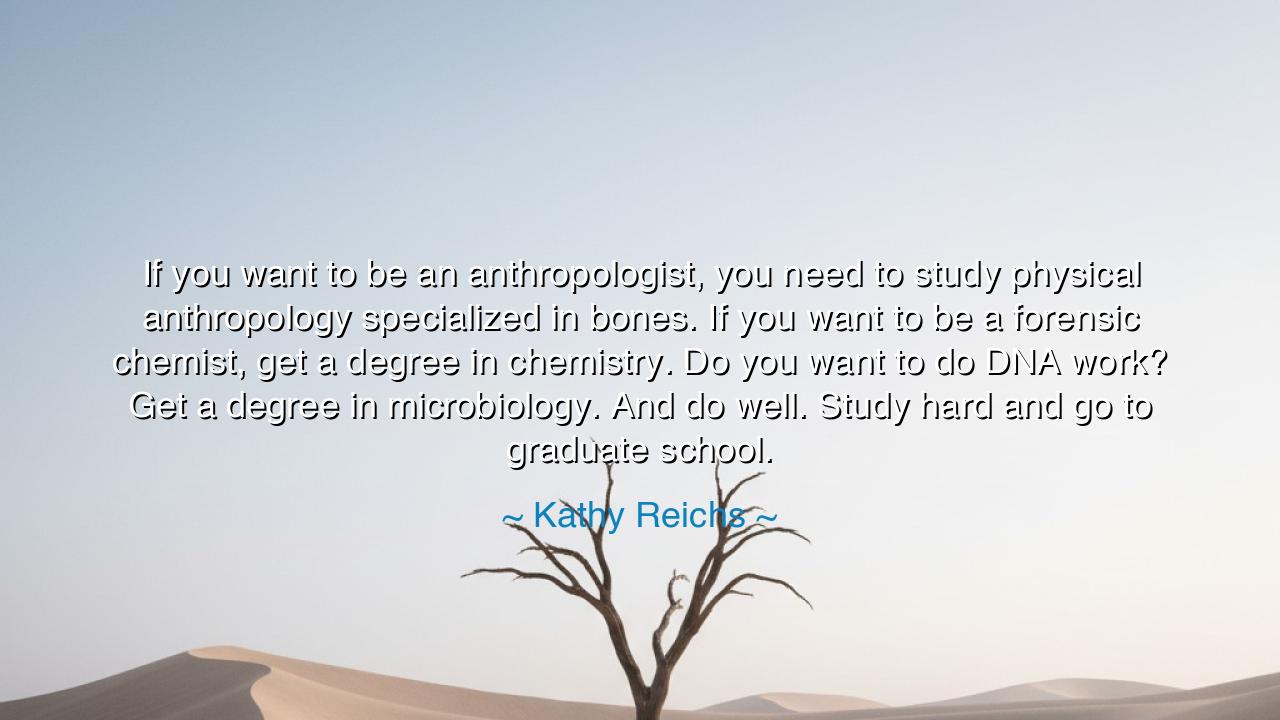
If you want to be an anthropologist, you need to study physical
If you want to be an anthropologist, you need to study physical anthropology specialized in bones. If you want to be a forensic chemist, get a degree in chemistry. Do you want to do DNA work? Get a degree in microbiology. And do well. Study hard and go to graduate school.






“If you want to be an anthropologist, you need to study physical anthropology specialized in bones. If you want to be a forensic chemist, get a degree in chemistry. Do you want to do DNA work? Get a degree in microbiology. And do well. Study hard and go to graduate school.” Thus counsels Kathy Reichs, forensic anthropologist and storyteller, whose life’s work has shown how truth is uncovered not by guesses or glamour but by discipline, study, and dedication. Her words are not cloaked in mystery, though she herself works in mysteries. They are a call to all who dream: if you wish to master a craft, you must give yourself fully to the discipline that builds it.
The meaning of this quote is both simple and profound. Reichs reminds us that dreams are not enough. To walk the path of science, art, or any noble pursuit, one must match passion with preparation. To want to be an anthropologist without studying bones is to want fruit without planting seeds. To wish to be a forensic chemist without chemistry is to chase shadows. The wisdom here is eternal: the greatness of one’s destiny depends upon the rigor of one’s study. And the path is never easy—it demands not only desire, but years of labor, sacrifice, and perseverance.
The ancients, too, echoed this truth. Hippocrates, father of medicine, demanded that his students spend long years learning the human body before ever prescribing a cure. Aristotle spent decades in Plato’s academy, sharpening his mind on philosophy and science before founding his own school. They knew that knowledge is not inherited, nor stumbled upon by chance. It is earned through diligence, through humility, through countless hours of study. Reichs’ words are the modern echo of this ancient law: study hard, and prepare yourself well.
Consider the life of Marie Curie, who hungered for knowledge at a time when women were denied access to higher education. She studied in secret, worked endlessly, and later entered the great universities of Paris. It was her relentless preparation, her years of sacrifice, that allowed her to uncover the mysteries of radioactivity and change science forever. Curie did not stumble into discovery—she walked the long, hard road that Reichs describes: a road of discipline and graduate study.
But Reichs’ words carry another truth: specialization. The path to mastery is not vague or broad, but specific. To handle bones, study bones. To handle chemicals, study chemistry. To handle DNA, study microbiology. Each path is narrow, and in walking it deeply, one gains the power to stand upon the frontier of human knowledge. This is the wisdom of choosing your road and committing to it fully, for to wander endlessly without focus is to be forever a novice.
The lesson for us is clear: whatever you dream to become, honor the discipline that builds it. Do not expect greatness without effort, nor mastery without study. Begin where you are, with books, with teachers, with humble practice. Embrace the long years of preparation, for they are not wasted time, but the furnace in which your skill and character are forged. And when weariness comes, remember that every hour of discipline brings you closer to the summit.
So let Reichs’ words echo as a command to all seekers: “Study hard and go to graduate school.” Do not despise the effort, nor fear the narrow road. For in the end, it is those who labor in study, who respect the discipline of their craft, who uncover the hidden truths of the world. Whether in bones, in chemicals, in DNA, or in the thousand fields of human knowledge, greatness belongs not to the dreamer alone, but to the dreamer who prepares, endures, and rises through learning. This is the ancient way, and it remains the only true way today.






AAdministratorAdministrator
Welcome, honored guests. Please leave a comment, we will respond soon